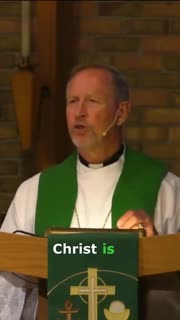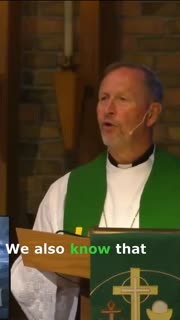Finding Peace: Christ's Power in Our Despair
Devotional
Sermon Summary
Bible Study Guide
Sermon Clips
### Quotes for Outreach
1. "Now, we also have our times right of despair where we feel like we're in our own little bubble and we are worried about everything going on in our life. And what we're looking for is Christ to bring us this same sense of peace. So we reach out to Him in shock prayer sometimes. How could you possibly let this happen to me, Lord? You know, are you going to do anything about it? In a similar prayer we may make. And we may also end up like the disciples in sort of a trembling anguish of dependence upon our God. And that's a good thing, because we want to be in trembling dependence." [09:25] (60 seconds)
2. "So these disciples, boating away, panicking underneath that storm, reach out to Jesus, wake him up, and he, of course, calms the sea. And it's a representation, as you know all too well, that Jesus indeed here is telling them, I am God. I can control anything. Put your dependence on me." [06:24] (20 seconds)
3. "Jesus, of course, calms the great seas, and they were then in awe. But that awe was, awe of being afraid. And you could say they were now in dependent amazement or dependent fear. They knew that they were dependent fully upon this Jesus Christ for their survival, and he controlled the wind and the waves." [07:14] (21 seconds)
4. "Christ is the one who gives us peace, who tells the entire chaos of the world around us to shut up, be still, be quiet. I am in control, and I can control the despair that's in your life. I can overturn all the chaos in this world and make it right. Whether in your timing or in mine, I will answer your prayer." [10:31] (23 seconds)
5. "Fear and trembling is when we have this great respect and awe for our God. As did Peter. You know, think of him as a disciple going through his denials, his re-acceptance by Christ, his great fear as he embraces his wife in this photo. Fear and trembling. Respect for what God can do in your life." [10:31] (23 seconds)
### Quotes for Members
1. "And he, Jesus, says to them on that day, Again, we're in control, hop in the boat, Jesus. We have it. And as soon as he was in their boat, and the other boats were with him, so we had other boats that apparently were accompanying this main boat, which we sometimes lose in the narrative, so it may be that others wanted to follow Jesus and disciples all the way to the other side of the lake. Then Mark doesn't talk about that anymore. And then a great storm of wind comes, and the waves begin to set upon the boat, with the result that the boat began to fill forthwith, fill up with water, and they would likely have begun bailing." [04:50] (44 seconds)
2. "And he arose, and he rebuked the wind, and he said to the sea lake, and instead of saying peace, the other way to interpret this is a little bit with stronger language. Shut up! Be muzzled. That's the other interpretation. Peace sounds so calming, doesn't it? Shut up! The words we probably tell our kids not to use right in the home. Don't say shut up. But shut up, be muzzled. And the wind abated, and a great calm occurred, and he said to them, Why are you cowardly? Do you not yet have faith?" [05:49] (30 seconds)
3. "It's a callback in the Septuagint. The same word that is used to rebuke the waves is used in Septuagint, by the way, as the Old Testament translated into Greek. And it was the text that Jesus and his disciples used at the time. Yes, the Old Testament was written in Hebrew, but everybody was basically speaking Greek at the time. So, in Egypt, in Alexandria, they had converted the Bible, the whole of the Old Testament and the Psalms and the Prophets, the whole, into Greek. And in the Greek, that same phrase, rebuke, is used in the use of a Greek word." [08:22] (34 seconds)
4. "We also know that in the Old Testament, it says, you know, in that book of Jonah and in that story, guess what Jonah was doing when the waves kicked up? He was snoozing. And he had maybe even had a more protected shelter where there might have been an enclosure on the front, too. But he was asleep in a large boat. And remember, everybody said, why is your God doing this to us? You know, what are we going to do? And of course, they all voted, and he agreed, throw me overboard, and maybe the sea will be calm. Well, that is a corollary, of course, to this text where Christ himself calmed the sea. Jonah was thrown into it. Christ did it directly." [09:25] (60 seconds)
5. "So when you have those struggles, we want to point up, we want to look up with a very watchful and a very attentive prayer to our God. To reach out, to be in conversation with him. To ask him for help in community, not just by yourself. That you go to our God, that you seek the peace that only he can give. And may the peace of God which surpasses all understanding, keep your hearts and minds in this Christ Jesus, our Lord." [10:31] (23 seconds)
Ask a question about this sermon
1. "Now, we also have our times right of despair where we feel like we're in our own little bubble and we are worried about everything going on in our life. And what we're looking for is Christ to bring us this same sense of peace. So we reach out to Him in shock prayer sometimes. How could you possibly let this happen to me, Lord? You know, are you going to do anything about it? In a similar prayer we may make. And we may also end up like the disciples in sort of a trembling anguish of dependence upon our God. And that's a good thing, because we want to be in trembling dependence." [09:25] (60 seconds)
2. "So these disciples, boating away, panicking underneath that storm, reach out to Jesus, wake him up, and he, of course, calms the sea. And it's a representation, as you know all too well, that Jesus indeed here is telling them, I am God. I can control anything. Put your dependence on me." [06:24] (20 seconds)
3. "Jesus, of course, calms the great seas, and they were then in awe. But that awe was, awe of being afraid. And you could say they were now in dependent amazement or dependent fear. They knew that they were dependent fully upon this Jesus Christ for their survival, and he controlled the wind and the waves." [07:14] (21 seconds)
4. "Christ is the one who gives us peace, who tells the entire chaos of the world around us to shut up, be still, be quiet. I am in control, and I can control the despair that's in your life. I can overturn all the chaos in this world and make it right. Whether in your timing or in mine, I will answer your prayer." [10:31] (23 seconds)
5. "Fear and trembling is when we have this great respect and awe for our God. As did Peter. You know, think of him as a disciple going through his denials, his re-acceptance by Christ, his great fear as he embraces his wife in this photo. Fear and trembling. Respect for what God can do in your life." [10:31] (23 seconds)
### Quotes for Members
1. "And he, Jesus, says to them on that day, Again, we're in control, hop in the boat, Jesus. We have it. And as soon as he was in their boat, and the other boats were with him, so we had other boats that apparently were accompanying this main boat, which we sometimes lose in the narrative, so it may be that others wanted to follow Jesus and disciples all the way to the other side of the lake. Then Mark doesn't talk about that anymore. And then a great storm of wind comes, and the waves begin to set upon the boat, with the result that the boat began to fill forthwith, fill up with water, and they would likely have begun bailing." [04:50] (44 seconds)
2. "And he arose, and he rebuked the wind, and he said to the sea lake, and instead of saying peace, the other way to interpret this is a little bit with stronger language. Shut up! Be muzzled. That's the other interpretation. Peace sounds so calming, doesn't it? Shut up! The words we probably tell our kids not to use right in the home. Don't say shut up. But shut up, be muzzled. And the wind abated, and a great calm occurred, and he said to them, Why are you cowardly? Do you not yet have faith?" [05:49] (30 seconds)
3. "It's a callback in the Septuagint. The same word that is used to rebuke the waves is used in Septuagint, by the way, as the Old Testament translated into Greek. And it was the text that Jesus and his disciples used at the time. Yes, the Old Testament was written in Hebrew, but everybody was basically speaking Greek at the time. So, in Egypt, in Alexandria, they had converted the Bible, the whole of the Old Testament and the Psalms and the Prophets, the whole, into Greek. And in the Greek, that same phrase, rebuke, is used in the use of a Greek word." [08:22] (34 seconds)
4. "We also know that in the Old Testament, it says, you know, in that book of Jonah and in that story, guess what Jonah was doing when the waves kicked up? He was snoozing. And he had maybe even had a more protected shelter where there might have been an enclosure on the front, too. But he was asleep in a large boat. And remember, everybody said, why is your God doing this to us? You know, what are we going to do? And of course, they all voted, and he agreed, throw me overboard, and maybe the sea will be calm. Well, that is a corollary, of course, to this text where Christ himself calmed the sea. Jonah was thrown into it. Christ did it directly." [09:25] (60 seconds)
5. "So when you have those struggles, we want to point up, we want to look up with a very watchful and a very attentive prayer to our God. To reach out, to be in conversation with him. To ask him for help in community, not just by yourself. That you go to our God, that you seek the peace that only he can give. And may the peace of God which surpasses all understanding, keep your hearts and minds in this Christ Jesus, our Lord." [10:31] (23 seconds)










